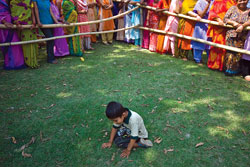 |
My brother, a young engineer, didn't want to miss voting in the constituent assembly elections. Like thousands of others, he left Kathmandu for his village in Dhanusa on Monday by night bus.
The journey till Dhalkebar was uneventful. But the Pahadi bus-driver refused to risk antagonising Jwala Singh, the renegade Maoist who has called for a Madhes banda. He dumped his passengers at dawn on Tuesday morning in the middle of nowhere.
The determined engineer travelled from Dhalkebar to Mahendranagar in one of the diesel tempos, banished from Kathmandu ten years ago for being too polluting, but which now form the backbone of public transport in the Tarai. But even the tempo-driver didn't want to risk driving into Janakapur. Ramnavami pilgrims and voters heading home had to take rickshaws to reach the capital of Mithila at four times the going rate.
This campaign has seen the expected level of campaign and poll violence. Assuming the elections are declared a success by Jimmy Carter and his co-observers, another question which is likely to emerge immediately afterwards is whether things will change fast enough in this country to address the aspirations of youngsters like my brother. If they don't, it wouldn't take long for the euphoria to turn into ennui and then explode into yet another upheaval.
It would be presumptuous to predict poll outcomes so early. But one doesn't need to be a psephologist to forecast the composition of the assembly. In all probability, it will be a hung-house dominated by the Big Three-NC, UML and Maoists-though not necessarily in that order. Once a place has been found to sit the 600+ member assembly under one roof, the first agenda before the house will be to elect a chair and formulate rules and procedures for its own operation.
Republicans in the country are hoping that the sessions will begin by announcing the abolition of monarchy through a unanimous decision or at least a voice vote. That appears highly unlikely. All kinds of delaying tactics will be employed by monarchists in every mainstream party to buy time.
The second order of business will have to be government formation. Their relative strength in the assembly notwithstanding, parties are bound by their previous agreements to form a coalition government. There is only one change that may happen, the leader of the largest party may get to Baluwatar. But this person will continue to be at the mercy of party bosses rather than assembly members.
Irrespective of surprises that the ballot boxes may spring upon the electorate, one thing is certain: the chairman will have to continue being the Graffiti President.
It's then that negotiations over fundamental principles of the supreme law will begin. Democracy, republicanism and federalism are mere words: manipulators can make them mean almost anything. After all, capitalist China is a People's Republic, North Korea is a Democratic People's Republic and Norway is a kingdom where the king is barely visible.
Post-election hopes are few, but fears many. Maoists are unlikely to go back to the jungle even if numbers fail them, but there is no guarantee that splinter groups of former rebels will not emerge to challenge the state. The often-postponed price hike of petroleum products must be tackled by a government willing to bite the bullet. Don't discount food riots a la Haiti as Nepal's food stockpiles head south as India builds up strategic reserves.
My brother will probably come back to Kathmandu wondering whether the trip home for polls have been worth the trouble. Taps in our house have been dry for over six months. There isn't going to be a Minister for Expediting Melamchi even after elections.
Hopefully, the red dawn of Nepali New Year on Sunday will bring new tidings.



